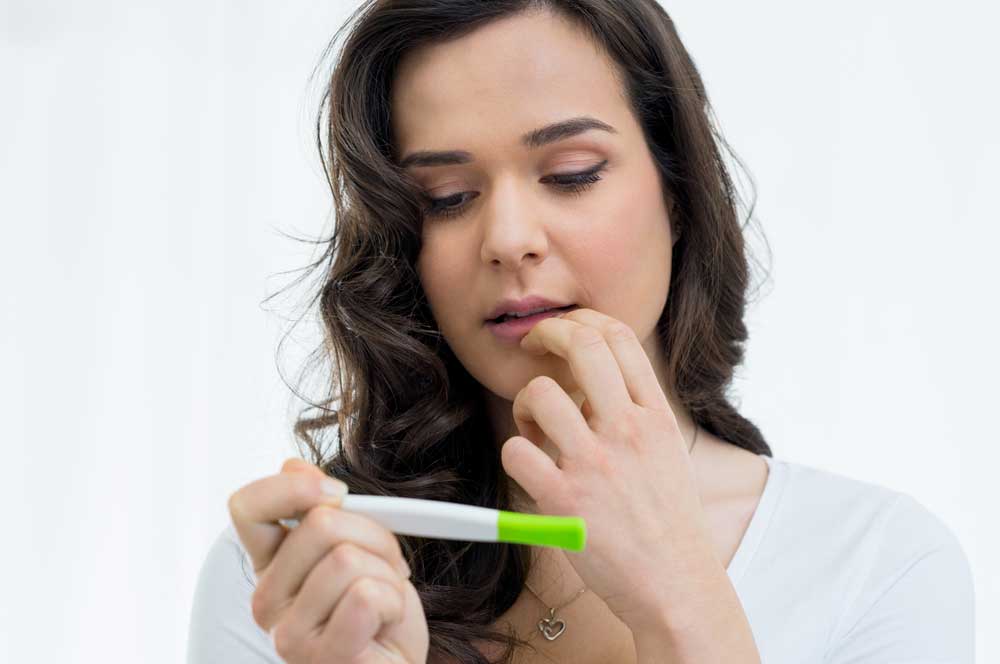 If you think you may be pregnant your next step should be scheduling a FREE Pregnancy Test from the Catherine Foundation. You do NOT have to go through this process alone. At the Catherine Foundation we can help you deal with the results, no matter what they are, in a manner that is best for you and your situation. We have compassion for you and want to help you in any way we can.
If you think you may be pregnant your next step should be scheduling a FREE Pregnancy Test from the Catherine Foundation. You do NOT have to go through this process alone. At the Catherine Foundation we can help you deal with the results, no matter what they are, in a manner that is best for you and your situation. We have compassion for you and want to help you in any way we can.
FIRST THINGS FIRST — Am I Pregnant?
If you think you may be pregnant it is important to know about the changes taking place in your body that may indicate pregnancy. Remember every woman is different and common signs of pregnancy may or may not pertain to your situation.
Some common symptoms of early pregnancy include:
- Missed period
- Nausea
- Vomiting
- Breast tenderness'uent urination
- Fatigue
For a complete list of pregnancy symptoms click HERE.
According to WebMD the only way to know for sure if you are pregnant is “by taking a pregnancy test”
At the Catherine Foundation we can give you a FREE and confidential pregnancy test. When you call for an appointment we will answer your questions and provide you with help you need every step of the way.
Use the calculator below to help approximate a likely due date if pregnancy is considered a possibility.
Note: This is not a sufficient/accurate tool for calculating fetal gestation. We highly recommend utilizing a medical grade pregnancy test, followed by an ultrasound to be fully informed. Contact us to schedule an appointment.
How Soon Should I Take a Pregnancy Test?
According to Healthline, “You should wait to take a pregnancy test until the week after your missed period for the most accurate result.
If you don’t want to wait until you’ve missed your period, you should wait at least one or two weeks after you had sex. If you are pregnant, your body needs time to develop detectable levels of HCG. This typically takes seven to 12 days after successful implantation of an egg.
You may receive an inaccurate result if the test is taken too early in your cycle.”
 Should I take a home pregnancy test?
Should I take a home pregnancy test?
According to a healthy lifestyle article on the Mayo Clinic website, “Taking a home pregnancy test can be nerve-wracking, especially if you’re not sure you can trust the results. Know when and how to take a home pregnancy test — as well as some of the possible pitfalls of home testing.”
If you are not sure when the best time is to take the home pregnancy test and take the test too early, check the test results too soon, use diluted urine or have been taking fertility drugs or medications containing HCG, there is a chance the results will be inaccurate.
Home pregnancy tests including such brand names as First Response, ClincialGaurd, Clearblue, Pregmate, New Choice and Wondfo, advertise to be 99% accurate.
National pharmacies and retail stores offer generic and store brand pregnancy tests including, Walgreen’s One Step, Target’s Early Results Pregnancy Test-Up&Up, CVS Early Result Pregnancy Test and Wal-Mart’s Equate Early Result Pregnancy Test.
All over the counter tests recommend if you think you are pregnant you should contact your health care provider. That is where the Catherine Foundation comes in. We can help you confirm your pregnancy and discuss your options for the future.
How do pregnancy tests work?
There are two basic kinds of pregnancy tests, the first uses urine and can be purchased over the counter, and the second test uses a blood sample and is administered in a doctor’s office or clinic. Both tests measure the level of the hormone hGC, human chorionic gonadotropin that indicates a pregnancy.
According to Medicinet.com, “hCG is made when a fertilized egg implants in the uterus. This usually happens about six days after the egg and sperm merge. But studies show that in up to 10 percent of women, implantation does not occur until much later, after the first day of the missed period. The amount of hCG rapidly builds up in your body with each passing day you are pregnant.”
Clinical pregnancy tests are more accurate than over the counter home tests.
The primary reason a clinical pregnancy test is more accurate than an over the counter home test is the experience and frequency in which the clinic administers tests. At the Catherine Foundation we have given thousands of tests and are constantly updating our kits for optimum freshness and accuracy.
There are many variables that lead to inaccurate readings from a home test. At the Catherine Foundation we do our best to eliminate those variables so you know for sure whether or not you are pregnant.
1- https://www.webmd.com/baby/guide/pregnancy-am-i-pregnant#1-2
3- https://www.medicinenet.com/pregnancy_test/article.htm#are_there_different_types_of_pregnancy_tests
4- https://www.healthline.com/health/pregnancy/five-signs-to-take-pregnancy-test#when-to-test

